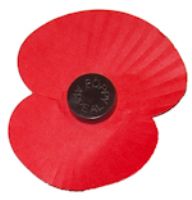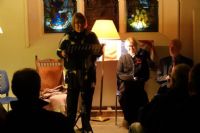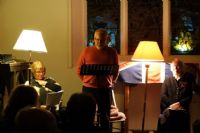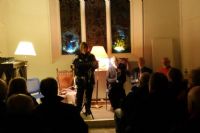

The Friends
Project Groups
Resources
|
|
|
World War Words World War Words First performed: 10/11/2018 We commemorated the lives of the 15 men who died whilst in service during World War 1 with a programme of poetry and prose chosen by Jane Burrell. © FNRC
Images from the Play
Script for the playBelow are links to the script or scripts used in the play. They can be downloaded or viewed on the web site.
We commemorated the lives of the 15 men who died whilst in service during World War 1 with a programme of poetry and prose chosen by Jane Burrell.
Display
World War Words links Why? 15 servicemen buried in NRC? Was there a 3rd Battle of Newbury that went unreported? When we started researching nearly 10 years ago we didn’t understand it. Other than being here what else do they have in common? All men, died in England, and their graves are maintained by CWG Commission CWG The Imperial War Graves Commission was set up in 1917, after some of these men had died, to provide for burials and memorials for everyone who died whilst in service to the Dominions and Colonies: Australia, Canada, India, South Africa, NZ and UK. All would be buried WHERE they died. This was to avoid bad feeling when the rich brought their loved one home. I see this as a significant development for Equality To know more, hear Jane talk on CWG, Town Hall next Saturday 6.30pm Differences Age 20-48 Class: labourers; tradesmen (butcher, baker, grocer, greengrocer); Several attended Newbury Grammar School and were in banking, magistrates clerk, dentist Most volunteered, some were conscripted; for single men 18-40 year old conscription started Jan 1916, married men were being called up by May 1916 Some died of natural causes, they would have died anyway from TB, tumour, abscess Some would have survived their illness or injury today, they died from sepsis, tetanus, blood loss – preparing tonight I learned that blood transfusion was almost non-existent till the Americans joined the Allies. Tonight, we will hear a selection of readings chosen by Jane B, read by Jane, Mike Huxtable and Paul Shave, along the way we will remember the 15 men whose graves are tended by the CWG, who clean the grave every other year and if the lettering is falling off add a Gallipoli plaque (designed originally for Gall.) We start with The Last Post, written in 2009 by Carol Ann Duffy, Poet Laureate, it opens with a phrase from Wilfred Owen’s poem ‘Dulce et Decorum est Pro Patria Mori’ in which he describes the agonizing death brought about by poison gas. Owen, himself, died – scythed down by machine-gun fire as he led his men in a dawn attack just seven days before the Armistice. Duffy writes the story of Owen’s war backwards, from the moment of death until the freedom of civilian life. What would life have been like for the hundreds of thousands if they had lived, not died?
When Alex Davis volunteered in 1914, he was leaving a safe life working in a bank in London, he had been ill and had had a serious operation in 1913 Having had a brush with death he knew no fear. In the early days, when it was mooted that the war would be over by Christmas, pro-war verse flooded the country and young men enlisted to avenge the savage ‘Hun’ and to defend the ‘English’ way of life. Rupert Brooke was a well-known literary figure - a golden boy of his generation; his well-known five sonnets entitled 1914 glorified England and the idea of dying for England, and they reflected contemporary – and popular - thought. A critical attitude towards the war didn’t happen before Alex’s untimely death. He died from a brain tumour in January 1915 and has a house named after him at St Barts. Paul will read Peace 1914 by Rupert Brooke
The next poem From the Front: The Song of the Trench by Capt. C W Blackhall] is an official-colloquial style of poetry, allowed by authority and much loved of magazines, because by looking at the minutiae of army life (and human nature) it gave the impression of realism with a sturdy attitude to horrors. For all that, a great many soldiers thought and behaved as the poem suggests. Rowland Raynor who was from Sheffield, embarked for France in August 1914, already a trained soldier, a driver in the Royal Field Artillery. He would have experienced the first days of trench warfare, when both sides ‘dug in’ after Germany had been halted by the allies in its bid to reach Paris. Almost every soldier on the Western Front experienced life in the trenches – occasionally terrifying, often boring, but always miserable. Mike will read The Song of the Trench Raynor developed TB and was sent to Newbury Hospital, perhaps they had spare beds, where he died in April 1915.
Philip BECKWITH was also not local. He lived in the Millbrook suburb of Southampton where he was remembered as a pillar of society: ex-Navy, standing for Council, cricket club committee; he then moved to Nottingham to run his own large motor garage. We do not know the reasons Beckwith enlisted, but he did so some time before conscription began and not long after his marriage. It might be to do with his string of motoring offences resulting in his losing his licence, not an easy situation for a garage owner. Pressure to join up was being applied in the media before conscription. Harold Begbie, a journalist, wrote Fall In in November 1914 to shame men into joining up. Paul will read ‘Fall In’ by Harold Begbie
Philip Beckwith in the Army Service Corps was billeted on Craven Street with his wife Annie It was here he died of a brain haemorrhage aged 42. Philip did not serve overseas but Harold Freeman did. At home he worked like his father as a pattern maker at Plenty’s. Having enlisted with the Royal Berkshire Regiment in August 1914 he was wounded on the 1st July 1916 at the Somme. In a monologue written by Graham Swannell for the actor Bill Fraser to read on the radio, Hec recalls his experiences of the Somme. He has been in care for the rest of his life, blind, he sits in his wheelchair and relates his story to an orderly behind him -except the orderly has left for other duties. Mike will perform an edited version.
A gunshot wound to Freeman’s shoulder caused complications. He was brought back to England but died in the Metropolitan Hospital London two months later. The NWN reported his death. Jane will read the report.
Frederick Pearce also joined the Royal Berks, in fact he re-joined, having already served with them. He served for almost 2 years before being wounded by shrapnel in December 1916. Also brought home he died of tetanus in King Edward VII hospital in Windsor, aged 43. Paul is going to read Rendezvous by Alan Seeger Alan Seeger moved to Paris from New York in 1912, and in 1914 he enlisted in the French Foreign Legion. He was killed (machine-gun fire) on the 4th day of the Battle of the Somme, and this poem reveals his willingness to die for a cause worth fighting for. Rendezvous by Alan Seeger Edgar Davies and Edward Savage died within a fortnight of each other early in 1917. They had both been to Newbury Grammar School and their mothers must have thought them set for a professional life before the war. Davies, whose family ran the china shop where McDonalds now is, was already a magistrate’s clerk. He was studying law. But he joined up in October 1915. Savage was training to be a dentist under his father. They lived and worked in Mansion House Street, where the British Heart Foundation charity shop now is. He joined the Royal Flying Corps as an Air Mechanic. Neither served overseas, perhaps their skills were too much in demand here but both died: Davies from a neck abscess which caused sepsis and Savage from pneumonia contracted after having measles. Our next reading is a poem by May Herschel-Clarke. ‘The Mother’ (published 1917) is in response to reading Rupert Brooke’s sonnet ‘The Soldier’. Bereavement is common, but what sets the bereavement of the Great War apart from the daily tragedies of a peacetime world is that over the whole of Europe especially (but also elsewhere), there was a sense that a whole generation had been lost. The poem begins with the first three lines of Brooke’s sonnet, and continues with the effect a son’s death would have on a mother. Jane will read The Mother by May Herschel-Clarke
SUICIDES: Many found the burden of active service unbearable. The unrelenting terror of front-line duty could drive some men to acts of breath-taking bravery, and others to desertion – both actions being a way to escape a hellish existence. At first, the condition of shell-shock and mental breakdown was not accepted as an illness. By 1917 special centres at the Western Front were set up to deal with severe cases of mental distress, and many men after a period of rest and quiet were able to return to the trenches; others never recovered.
To be ‘windy’ was understood and sympathised with; windiness was almost universal and men ‘did their job’ in spite of it. But ‘funk’ (shirking the job) was held in contempt. However, the death of a ‘coward’ (so-called) was rarely reported as such to the next of kin. Those ‘shot at dawn’ would be reported as KIA, and those who didn’t acquit themselves well would be reported as having died with honour. In these times of Mental Health Awareness, we should not be surprised that at least one of our 15 committed suicide. It should also be remembered that at this time attempting suicide was still a crime! Alfred Griffiths, a greengrocer and market gardener in Bartholomew St, joined up despite having suffered from depression for many years. He was sent as a gunner to Plymouth Royal Garrison Artillery but even that was too much for him. He spent most of his 3 months in service in hospital. He slit his throat but was found in time. However, without the option of a blood transfusion he died the next day Such is Death by Capt. Charles Hamilton Sorley is our next poem. Charles Hamilton Sorley was shot dead by a sniper at the Battle of Loos on 13 Oct 1915 aged 20. Unlike some poets who showed a steady progression in feeling from early patriotism to later horror, Sorley exhibited from the start an awareness of the futility and stupidity of war. This poem, written in 1915, was included in ‘Marlborough and Other Poems’ published by his parents the year after his death; in the preface his father wrote ‘He looked on the world with clear eyes and the surface show did not deceive him.’ Such is Death will be read by Mike We do not know that William Jackson committed suicide. He is our oldest casualty, aged 48. He had a series of ‘accidents’: first he was run over by a tractor in France, brought back to England he suffered another accident and his ribs were broken. He was sent to Newbury to convalesce with his sister. He walked out on to the road one November afternoon and was knocked down, this time fatally, by a mail truck from Stradling & Plenty. The driver did have headlights and was found not to be at fault. William’s sister gave evidence that his nerves were “completely shattered”.
Siegfried Sassoon (1886-1967) wrote ‘Survivors’ whilst he was a patient at Craiglockhart in Oct 1917. This hospital nursed officers suffering from shell shock (now termed post-traumatic stress) brought about by front-line war service. Symptoms included fatigue, uncontrollable shaking and nightmares. More resources were expended upon officers than men, mainly because of their scarcity; however, this did give the impression that the men were little more than ‘cannon fodder’. Survivors will be read by Paul. Philip Webb was employed by Whitehorn’s Bakery, enlisted in July 1915 and saw plenty of action. He was deployed as a Gunner in Vimy Ridge, Salonika, Egypt and Palestine. Like his colleagues he suffered from a wide range of illnesses and infections: enteric, malaria and typhoid fevers. Wounded by shellfire after crossing the Jordan, he was hospitalised in Cairo, later Birmingham but died of a haemorrhage 5 months later. The saddest thing for his wife, Emily, was that their only son died 3 months later.
Rudyard Kipling’s only son, John, was killed on 27 Sep 1915 at the Battle of Loos just a few weeks after his 18th birthday. Although Kipling had not forced his son to enlist, he did everything he could to help him – pulling the many influential strings at his disposal. Since the outbreak of war, Kipling had been a leading figure in early propaganda, but the effect of John’s death changed his emphasis and modified what had seemed jingoistic. Written in 1919, the title conveys both the agony and the necessity of war.
By the time the Webb father and son died, influenza had started to take its toll. One of the down sides of America joining the war effort was the epidemic their troops brought with them. Half the population of the world were infected and 228,000 died in the UK. Both Percy Richardson and Edward Pellew Plenty were to succumb to it. Percy, a carpenter, had married a Newbury girl, Flossie Colton, a cook, 11 days after he enlisted in 1916. He died in the Stanford Road Military Hospital, Preston, Brighton 2 days before the end of the war. Out next poem is by May Wedderburn Cannan who worked as a VAD (Voluntary Aid Detachment) nurse before and during the war, and towards the end worked for MI5 in Paris. She was engaged to Maj Basil Quiller-Cooch MC; he had served continuously from 1914-1918 without a wound, but he succumbed to the Spanish ‘flu in Feb 1919. May describes the experience felt by many young women whose fiancés or husbands had died in the war. ‘Crossed swords’ beside a name in the Army List indicated the officer had seen active service, and a ‘scarlet cross’ on a bibbed apron indicated a VAD nurse.
So the war had ended but deaths continued. Edward Pellew Plenty was being groomed to take over the family business but at the beginning of the war enlisted in the Army at age 17. He said he was 18 years and 6 months. He was sent to Sandhurst for officer training but despite being given a commission in the Manchester Regiment moved on to Flying School. He flew with No 1 Squadron of the Royal Flying Corps and was asked to prepare a new squadron for duty. He became a Major when he was only 20. He was twice mentioned in dispatches. A week after the Armistice he flew back from France feeling exhausted. He died in the County Hospital, Huntingdon where he was stationed, his father at his side. Pilot Officer John Gillespie Maghee Jr, the son of an American father and an English mother – both missionaries, was educated in England at Rugby School – Rupert Brooke’s old school. In the United States at the start of WWII, he volunteered for war service with the Royal Canadian Air Force in 1940 aged 18. He saw active service in Spitfires, surviving nine weeks of active service. Whilst practising air fighting tactics on 11 Dec 1941, his aircraft was involved in a mid-air collision with a trainee pilot – both pilots died; Maghee was just 19yrs old. The poem became known in more recent times when it was recited by President Ronald Reagan after the Challenger disaster in 1986. It has always been a favourite of pilots and astronauts.
Just before the end of the war John Digweed was conscripted into the Army. He was described as having a poor physique and was moved around presumably to find out where he could be most useful. Eventually he was allocated to the P&L Branch at Isleworth Army Service Corps Motor Transport Depot. A few months later he was diagnosed with TB and died shortly afterwards at the Royal Alexandria Hospital, Cosham. Sassoon describes the death-bed ordeal of a young soldier mortally wounded on the Western Front. Although he is in hospital, there are frequent reminders of the trenches. The soldier is on the border between life and death, until Death himself comes to stand at his bed The Death Bed by Siegfried Sassoon will be read by Paul Many of our 15 died in hospital, cared for by nurses and maybe with family around, something never possible in the trenches. Thomas Maccabee experienced it all. He was living in Wash Common and working as a painter and decorator when in 1914 he enlisted with the Royal Berkshire Regiment. He was wounded at the Battle of Cambrai. It was not always easy to retrieve the dead, dying and wounded from a battlefield or from no-man’s land. Often the wounded had to wait until nightfall to start the slow crawl back to their lines, sometimes being sniped at. If they were unable to move because of their wounds, or because they were too exposed to enemy fire, a slow death awaited them. Thomas lay for three days and freezing nights. His brother, Reginald – aged 23, was wounded in the same battle, dying the following day – when Thomas was still lying helpless on the battlefield. Following his evacuation to England, Thomas endured 27 months of agonising treatment, dying with his parents at his side after the failure of the 19th operation. Thomas was not recorded on the CWGC roll of honour until 26 Jun 2014 – when documented research enabled the ‘In from the Cold Project’ to ensure his addition. A CWGC stone has now been added to his grave. ‘We could do nothing to help’ a diary entry of Capt. Edwin Campion Vaughn, 27 Aug 1917 will be read by Mike and Jane will follow this with a short poem by May Wedderburn Cannan ‘We could do nothing to help’ by Mike Love, 1916 read by Jane Cecil Quarterman was working at Carey’s music shop on Northbrook Street when he enlisted in the Royal Garrison Artillery before the war in 1913. Cecil was gassed several times, but it was a bullet in his shoulder fired from an aeroplane in 1917 that sent him home. He was treated at Albion House Hospital (opposite The Chequers) and returned to service as an instructor in 1919. But the earlier gassings had taken their toll and he eventually was sent to Peppard Sanatorium suffering from TB from which he did not recover, dying age 26 in July 1920. The next poem is Dulce et Decorum Est Pro Patria Mori by Wilfred Owen The final phrase of this poem is from an ode by the Latin poet, Horace – roughly translated as ‘It is a wonderful and great honour to die for your country’. It was popular with Roman conquerors, and at the start of the Great War. By using the imagery of the effects of poison gas, Owen is highlighting graphically, even horrifyingly, just how wrong such a sentiment was. Gas was used by both sides, mostly on the Western Front. The poem describes symptoms of a combined chlorine/phosgene gas, where death was caused by slow suffocation over a day or two. Quarterman was more likely the victim of chlorine gas alone; the clouds of green chlorine were terrifying, causing damage to the lungs, but the effects were not immediately deadly. Paul will read Dulce et Decorum Est Pro Patria Mori So much sacrifice, so much death, was it all worth it? What would the ghosts of our 15 think if they saw society a few years later? The next poem describes the frenetic lifestyle of post-war Britain through the imagery of a victory ball. Poignancy is added by the ghosts of soldiers who are witnessing the goings-on, behaviour which seems to render insignificant their sacrifice. Mike will read ‘The Victory Ball’ by Alfred Noyes Jennifer Henderson, a local author, wrote the final poem to remind us that the message of peace is as important as the honouring of the dead. Merely to concentrate on remembrance does the dead a disservice, as well as those broken by war. We need to remember in order to avoid making the same mistakes. A gravestone or a memorial is a timely reminder. Jane will read Written in Stone by Jennifer Henderson. Applause & Refreshments Copyright: ©Ros Clow and Jane Burrell |
Website designed and maintained by Paul Thompson on behalf of the Friends of Newtown Road Cemetery.




